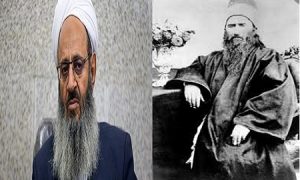Abdul Hamid Ismaeel Zehi, the leader of Friday prayer of Makki Mosque in Zahedan pleased the enemies of the regime in his Friday prayer sermons on Khordad 26, 1402 S.H. by repeating biased and anti-religious statements in support of the organization of the deviant cult of Baha’ism.
Also, he spoke about the Baha’is rights in his Friday prayer sermons on solar month of Day 9, 1401 S.H. and defended them and emphasized the equality of their rights with Muslims. While his words are against the fatwas of the Sunnis and the fatwas of Diwbandi scholars and Abdul Hamid also considers himself a scholar of Iran’s Diwbandis.
Mawlana Muhammad Omar Mullah Zehi, known as Mawlana “Mohammed Omar Sarbazi”[1] is one of the famous scholars of Diwband and the founder of the “Manba-Al-Uloom Kooh Van” school has considered Shia and Sunni Baha’ism to be infidels in the famous jurisprudence book “Fatwas of Kooh Van Source of Sciences ” and has defended and supported their economic sanctions. Mawlana Mohammad Omar Sarbazi is writing in volume 8 of the book Fatwas of the source of sciences to respond a question: Why you don’t stop the Baha’i cult and why the scholars don’t inform the people? :
“On the Baha’i and Communist blasphemy fatwa, all of us Sunnis and Shiites are in agreement and at the same time as we are in agreement with in the economic sanction” [2]
Clarifying that the Pahlavi regime backed and supported the Baha’is, he added that he encouraged the system of the Islamic Republic to repress this cult.
“It is certain that before the Islamic Republic, during the Pahlavi regime, the Baha’is were emerging and progressing and they had put most of the cities of Sistan and Baluchistan under pressure. Sunni and Shia scholars and common people rose up and even clashed with them to oppose them (maybe, you have heard the incident of a clash with Baha’is in Iranshahr and Dr. Majdpour in Sarzab city), but people did not succeed because the Pahlavi regime was supporting them and did not oppress them.
Thanks God, now when the system of the Islamic Republic has been implemented and the overall power has fallen into the hands of Shia and Sunni scholars, we have seen that Baha’ism and communism have become ineffective and unknown… our opinion is that, may Almighty God bless the Islamic Republic with good things…”[3]
Mohammad Omar Sarbazi also emphasizes supporting the system of the Islamic Republic of Iran by Sunnis in terms of religion and politics concerning the sanctions and economic pressure on Baha’is and writes:
“Of course, it is beyond our power to take away their economic cases. Yes, if this is from the Islamic Republic, it will be very easy to prevent them, and we Sunnis will not hesitate to cooperate and help with the officials and agents of the Islamic Republic..”[۴]
Mawlana Sarbazi divides the Baha’is into three categories concerning atonement and considers two types of them to be apostates and lacking in atonement, and considers the third type to be the same as the atonement of atheist and magi. In response to a query about the Baha’i cult’s atonement and its amount, he writes:
“There are two types of deviant Baha’is:
۱- Those who are Muslims first and later joined this misguided cult. If one of this group is killed before repenting and turning to Islam, there is no atonement; because he has become an apostate and the blood of an apostate is a waste according to the consensus of the Imams.
۲- If he was born in a Baha’i house from the first day and was born in the very religion, he is not out of two situations: A) He has a trust in his hand from the Imam of the Muslims; B) None of these.
If he has asked for security, his debt is like the debt of a heretic and a Magi, and his/her atonement is similar atheist and magi and their atonement is 800 dirhams according to the Three Imams[5] and it is like the Muslim atonement according to Abu Hanifah, and if he does not have any of these things[6], his blood is wasted[7] and there is no payment; because he has denied the finality of Prophethood and is a disbeliever and must be killed….”
Source
Sarbazi, Mohammad Omar, Fatawi of the Source of Sciences of Kooh Van, the Religious School of Source of Sciences of Kooh Van, first edition, 1385 S.H.
[۱] ۱- http://taefamirnsknde.blogfa.com/post/9
[۲] Sarbazi, Mohammad Omar, Fatwas of Kooh Van Source of the sciences, Volume 8, p. 150, the Al-Jihad book, the chapter which is related to politics.
[۳] Sarbazi, Mohammad Omar, Fatwas of Kooh Van Source of the sciences, Volume 8, p. 150, the Al-Jihad book, the chapter which is related to politics.
[۴] Sarbazi, Mohammad Omar, Fatwas of Kooh Van Source of the sciences, Volume 8, p. 150, the Al-Jihad book, the chapter which is related to politics.
[۵] Shafi’i, Malik, Ahmad bin Hanbal.
[۶] has not received a trust from the Islamic ruler
[۷] Sarbazi, Mohammad Omar, Fatwas of Kooh Van Source of the sciences, Volume 8, p.195, the book” the atonements.






